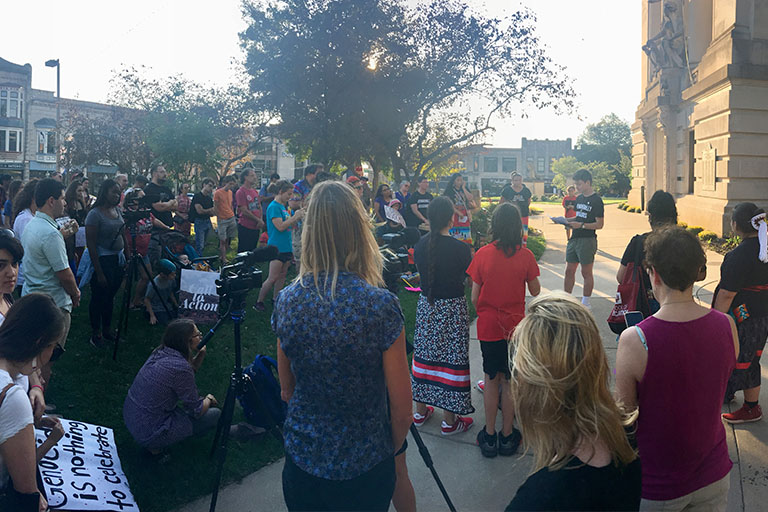At first, Caleb King was not sure how many people would actually show up. A sophomore at IU Bloomington from Anchorage, Alaska, and a member of the Sugpiaq Alaska Native people, King had helped organize a march to honor Indigenous Peoples‘ Day in Bloomington. The Facebook event for the march had generated significant community interest, but King was not sure how many people would actually attend.
Soon enough, though, attendees began to trickle in. By the march’s designated start time, roughly 150 people had gathered in IU Bloomington’s Dunn Meadow. As they began to march towards the Monroe County Courthouse, someone in the crowd began to sing.
“All you could hear was this Indigenous man, with the beat of his drum, singing a beautiful powwow song all the way there. Indigenous voices are ringing throughout the city, throughout the streets, and that was absolutely amazing,” King said. “It felt like change was happening in that moment.”
The march through town represented the culmination of weeks of work to recognize Indigenous Peoples’ Day on Oct. 8, a day often recognized in the United States as Columbus Day. Working with other students from the Native American Students Association, King lobbied the city to instead recognize Indigenous Peoples’ Day, in an effort to highlight the communities who were displaced by European occupation of historically Indigenous lands throughout the United States.
Several days before the march was set to take place, King got his response: the Bloomington Mayor’s Office would issue an honorary proclamation recognizing the second Monday in October as Indigenous Peoples’ Day.
"In a state whose name means "the Land of the Indians," it's only appropriate that we celebrate the cultures and contributions of our indigenous residents, past and present," said Bloomington Mayor John Hamilton. "If there's one thing that we've learned in the year since the deadly clashes in Charlottesville, it's that symbols are powerful. It's about time that we stand with cities and states around our nation that are replacing the symbolism of oppression with that of respect by renaming the second Monday in October Indigenous Peoples' Day."
When he heard the news, King was ecstatic. He and his fellow students had sent hundreds of emails to members of the IU and Bloomington communities, seeking support for their cause. Though they had received some negative comments, the community had largely embraced their cause. And by pushing for the Mayor’s Office to recognize Indigenous Peoples’ Day, the group had succeeded in aligning the city with principles of justice for Indigenous people, both in Indiana and beyond.
““It meant so much to know that a political institution was supporting the Indigenous people of Indiana and Indigenous people of Bloomington,” King said. “It meant that they were hearing our voices and that this was a stance of solidarity at a time where solidarity isn’t seen very often.”
Nicky Belle, the director of the First Nations Educational and Cultural Center, a center supported by the Office of the Vice President for Diversity, Equity, and Multicultural Affairs, saw the students’ work as a valuable experience that reinforced the importance of advocacy as a means of progress.
“I was happy to see students realizing, “wow, we can really create this momentum, we can be a part of this change,”” Belle said.
James C. Wimbush, IU’s Vice President for Diversity, Equity, and Multicultural Affairs, Dean of The University Graduate School, and Johnson Chair for Diversity and Leadership, hoped that the success of the movement will inspire other students to get involved and push for change, both at IU and in the broader community.
"It is so exciting to see that the activism of IU Bloomington students has led to an honorary recognition of Indigenous Peoples' Day in our community,” Wimbush said. “Though this work is no doubt difficult, I am encouraged that our students can see firsthand how their contributions help build a more just and equitable society."
In addition to acknowledging the injustices done to Native communities in the past, King also hoped that recognizing Indigenous Peoples’ Day would set the stage for future activism. The honorary proclamation of Indigenous Peoples’ Day was not legally binding, meaning further action is needed to legally and officially recognize the holiday in the city of Bloomington.
King said that working to remedy this discrepancy, as well as ensuring that IU Bloomington’s language reflects Indigenous Peoples’ Day, would be key priorities going forward. In doing so, King also hopes to highlight that Indigenous communities still live in Indiana and throughout the United States, and that their experiences should not only be discussed in the past tense.
“Indigenous people were driven out of this land by colonialism, manifest destiny, the discovery doctrine, saying that the land is no longer ours. This is one step going forward to say this land is still ours, and we are still present,” King said.


